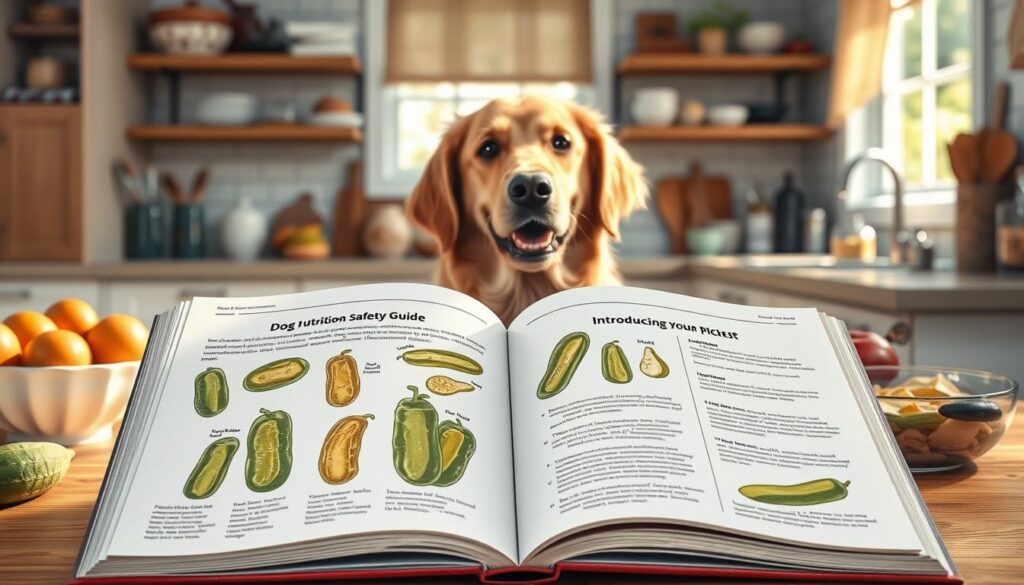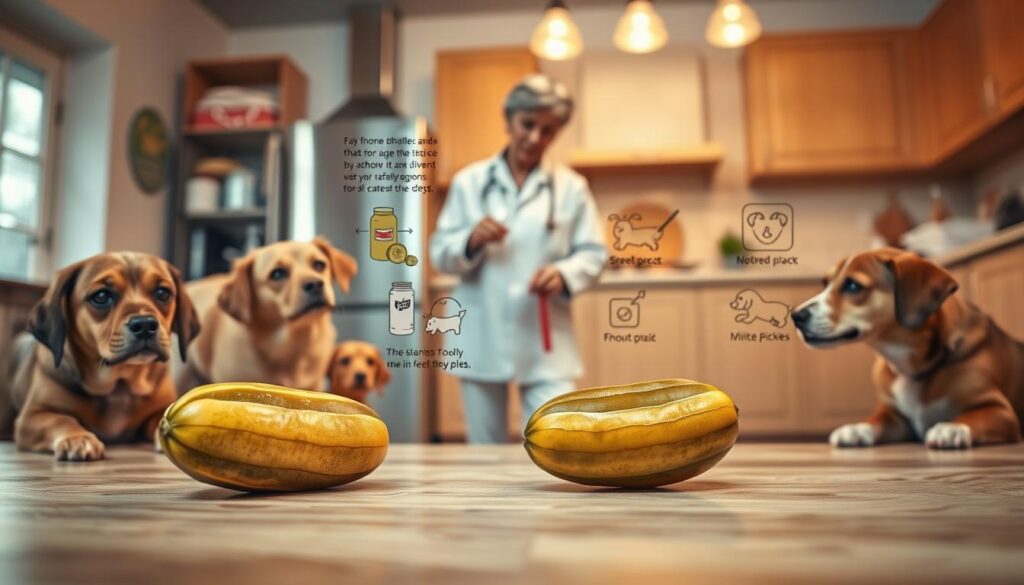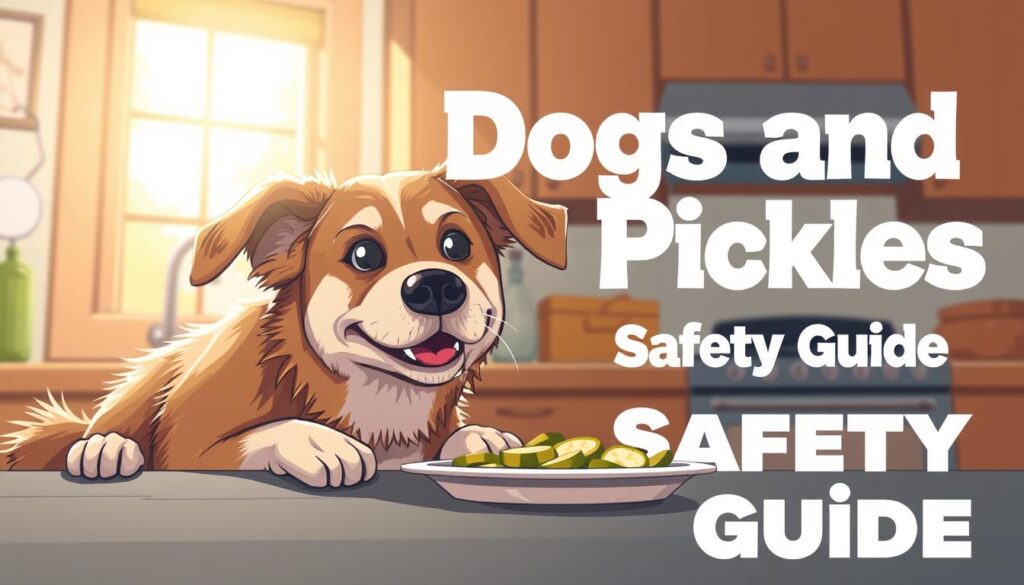Table of Contents
Can Dogs Have Pickles
As a devoted dog owner, I know you might wonder about sharing human foods with your furry friend. The question of whether dogs can have pickles is more complex than it seems. Every pet parent wants to make sure their dog’s diet is safe and fun.
Exploring if pickles are safe for dogs involves understanding the risks and benefits. Are pickles a healthy treat or a potential danger for your dog? This guide will help you understand the nutritional aspects and safety concerns of feeding pickles to your dog.
Veterinary nutritionists stress the importance of knowing what foods are safe for dogs. While pickles might seem harmless, they can contain ingredients that could harm your pet. Our detailed exploration will guide you in deciding if pickles are right for your dog’s diet.
Key Takeaways
- Pickles are not a natural part of a dog’s diet
- Some pickle ingredients can be harmful to dogs
- Moderation is crucial if considering pickles
- Always consult with a veterinarian before introducing new foods
- Natural, dog-friendly alternatives exist
Understanding Pickles and Their Ingredients
Pickles are more than just a tangy snack. It’s important to know what makes them when thinking about dogs eating them. The pickling process turns fresh cucumbers into tasty treats.
Looking into cucumber pickles and dog safety means checking out their main parts. Pickles start with cucumbers and go through a change that affects if they’re good for dogs.
What Are Pickles Made Of?
The basic ingredients for can dogs eat dill pickles include:
- Fresh cucumbers
- Vinegar
- Water
- Salt
- Spices
Common Pickling Ingredients
Different pickling methods use various ingredients that can affect a dog’s stomach. Traditional pickling involves fermentation or brining, which makes them taste different and keeps them fresh.
Types of Pickles
Dog owners should know about different pickle types:
- Dill pickles
- Bread and butter pickles
- Kosher pickles
- Sweet pickles
Each type has its own ingredients that might be risky or hard for dogs to digest. Knowing these differences helps make better choices for your pet’s food.
Nutritional Value of Pickles for Dogs
Pickles are an interesting food for dogs, but they have a complex nutritional profile. It’s important to understand the good and bad of pickles for pets.
Pickles have some nutrients that might interest pet owners. But, they don’t offer much for dogs. Let’s look at the key nutrients:
Vitamins and Minerals in Pickles
Dogs might get some benefits from pickles, but they are small:
- Vitamin K: Helps with blood clotting
- Sodium: Keeps electrolyte balance
- Small amounts of calcium and iron
Caloric Content in Pickles
Pickles have few calories, making them safe for dogs’ diets:
| Pickle Type | Calories per Serving |
|---|---|
| Dill Pickle | 4-5 calories |
| Bread and Butter Pickle | 20-25 calories |
Potential Allergens in Pickles
Be careful with pickles because of potential allergens:
- High salt content
- Potential spices
- Vinegar sensitivity
“Not all human foods are safe for dogs. Always consult your veterinarian before introducing new items to your pet’s diet.” – Veterinary Nutrition Expert
Remember, while pickles might seem harmless, they should be approached with caution in a dog’s diet.
Are Pickles Safe for Dogs to Eat?
Thinking about pickles in a dog’s diet needs careful thought. Pickles might seem like a safe snack, but they’re not always good for dogs. There are several things to consider that could affect your dog’s health.
Vets say it’s important to look at what’s in pickles and how they might affect your dog. Dogs can be very sensitive to certain foods. This makes it key to know the risks.
Risks of Feeding Pickles to Dogs
Pickles can be dangerous for your dog:
- They have a lot of salt, which can cause dehydration
- They might have garlic or onions, which are toxic
- They can upset your dog’s stomach
- They might cause an allergic reaction
Safe Serving Sizes for Dogs
If you want to give your dog pickles, only give a tiny bit. Experts say even a small amount can be risky. A small piece might be okay, but always check with your vet first.
Signs of Distress in Dogs After Eating Pickles
Look out for these signs if your dog eats pickles:
- They drink a lot of water
- They vomit
- They have diarrhea
- They seem tired
- They have stomach pain or feel bloated
“When in doubt, always prioritize your dog’s health over an experimental treat.” – Veterinary Nutrition Experts
So, are pickles safe for dogs? Usually, no. Your dog’s health is more important. There are many safer, healthier treats that are just as fun.
Health Benefits of Pickles for Dogs
Many pet owners look into dog-friendly foods for their pets. Pickles are an interesting choice, but their benefits need careful thought.
Pickles aren’t a top pick for your dog’s diet. Yet, some types might offer special health perks.
Probiotics in Some Pickles
Some pickles have good probiotics for your dog’s gut. These tiny helpers can:
- Improve gut health
- Boost immune function
- Help absorb nutrients better
Hydration Benefits from Pickles
Thinking about pickles for dogs? They’re good for staying hydrated, especially in hot weather. Pickles are full of water.
| Pickle Type | Hydration Potential | Sodium Content |
|---|---|---|
| Dill Pickles | Moderate | High |
| Fermented Pickles | Good | Moderate |
Alternative Healthy Snacks for Dogs
Instead of pickles, try these safer and more nutritious alternatives:
- Cucumber slices
- Carrots
- Apple chunks (without seeds)
- Watermelon pieces
Always talk to your vet before adding new foods to your dog’s diet. This ensures your pet stays healthy and safe.
When to Avoid Feeding Your Dog Pickles
It’s important to know when pickles could be bad for your dog. Dog pickle consumption needs careful thought. This is to keep your furry friend healthy.
Not every dog can safely eat pickles. Some health issues and ingredients can be risky.
Medical Conditions to Consider
Some dogs face health problems that make pickles risky. Certain conditions can make it hard for them to eat pickles safely:
- Dogs with kidney problems
- Pets with high blood pressure
- Dogs suffering from heart disease
- Animals with sodium sensitivity
Pickles with Added Ingredients
When thinking about can dogs eat dill pickles, watch out for extra ingredients. Some pickles have harmful stuff:
| Ingredient | Risk Level | Potential Impact |
|---|---|---|
| Garlic | High | Toxic to dogs |
| Onions | High | Can damage red blood cells |
| Excessive Salt | Moderate | Dehydration risk |
Age Considerations for Dogs
Your dog’s age matters when it comes to pickles. Younger and older dogs often have more sensitive digestive systems. Puppies and senior dogs might find it harder to digest pickles than adult dogs.
Always talk to your vet before adding new foods to your dog’s diet. This is especially true for risky foods like pickles.
How to Introduce Pickles to Your Dog’s Diet
Feeding pickles to pets needs careful thought. Cucumber pickles can be a fun treat sometimes. But, always think about your dog’s health first.

- Start with tiny, bite-sized pieces
- Choose plain, unseasoned cucumber pickles
- Avoid pickles with additional spices or garlic
- Limit quantity to minimal amounts
Gradual Introduction Techniques
Introduce new foods slowly to your dog’s stomach. Start with a small piece, like a pea. Watch for any signs of trouble. Patience is key here.
Monitoring Your Dog’s Reaction
Keep a close eye on your dog after trying pickles. Look out for signs like:
- Excessive gas
- Vomiting
- Diarrhea
- Reduced appetite
Providing Fresh Options
If pickles upset your dog, try other healthy snacks. Fresh cucumber slices are a good choice. Always think about what’s best for your dog and talk to a vet for advice.
Alternatives to Pickles for Dogs
It’s important to find safe and healthy treats for dogs. They need foods that are good for them and taste great. Knowing the risks of pickles helps pet owners choose better for their dogs.
Finding healthy alternatives to pickles is easy. There are many options that are good for dogs and taste great.
Safe Vegetables for Dogs
- Carrots: Crunchy and low-calorie
- Cucumber: Hydrating and refreshing
- Green beans: Packed with nutrients
- Pumpkin: Supports digestive health
Dog-Friendly Fruits
- Apples (without seeds)
- Watermelon (seedless)
- Blueberries
- Strawberries
Homemade Treat Options
Making treats at home lets you control what goes into them. Try making frozen veggie treats or dehydrated sweet potato chews for a healthy snack.
Always consult with your veterinarian before introducing new foods to your dog’s diet.
Remember, give treats in moderation. Every dog is different, so watch how they react to new foods.
Frequently Asked Questions About Dogs and Pickles
Pet owners often wonder if they can feed pickles to their dogs. It’s important to know if dogs can have pickles to keep them safe and healthy. This section answers common questions about dogs and pickles, helping you care for your furry friend.

Can Dogs Have Dill Pickles?
Dill pickles can be a tricky choice for dog owners. They’re not toxic, but they’re not good for dogs to eat often. The salt in pickles can lead to:
- Excessive thirst
- Sodium ion poisoning
- Digestive discomfort
Are Bread and Butter Pickles Safe?
Vets usually say no to both dill and bread and butter pickles. Bread and butter pickles have extra sugar and spices that can harm dogs. These can cause:
- Stomach upset
- Potential allergic reactions
- Unnecessary calorie intake
What About Pickle Juice?
Pickle juice is definitely not safe for dogs. Pickles, especially the brine, are not good for dogs. The salt and vinegar can lead to:
- Dehydration
- Electrolyte imbalances
- Potential kidney stress
Always consult with your veterinarian before introducing any new food to your dog’s diet.
Customer Testimonials and Experiences
Many pet owners have shared their stories about dogs eating pickles. Each dog reacts differently, showing how important it is to know how your pet will react.
When pet owners give pickles to their dogs, they get mixed results. Here are some key points:
- Dogs with sensitive stomachs might feel sick right away
- Some dogs can handle a little pickle without problems
- The dog’s breed and health also matter a lot
Positive Experiences from Pet Owners
Some dog owners have had good experiences with pickles. Sarah Martinez, a veterinary technician, said her terrier sometimes likes a small pickle slice.
“I always watch my dog closely and give only tiny amounts,” Martinez said.
Negative Reactions to Feeding Pickles
But not all stories are happy. Some owners saw bad signs after giving pickles to their dogs, like:
- Stomach problems
- Drinking more water
- Issues with too much sodium
Expert Opinions on Dogs and Pickles
Vets say to be careful with pickles. They’re not bad for dogs, but they’re not good for them either. The salt and extra stuff in pickles can be harmful.
Experts suggest being careful and watching your dog closely if you want to give them pickles. Always talk to your vet before adding new foods to your dog’s diet.
Conclusion: Making Safe Choices for Your Dog
Finding the right foods for your dog can be tough. It’s important to know if pickles are safe for them. Understanding the risks is key.
Thinking about pickles and dog food brings up some key points. These help you make better choices for your dog:
- Always talk to your vet before trying new foods
- Choose foods that are good for your dog
- Watch how your dog reacts to new foods
- Know what your dog needs for their health
Final Feeding Recommendations
Your dog’s health is in your hands. Pickles might seem okay, but they’re not the best choice. Here are some better snack options:
| Safe Snack | Nutritional Benefit |
|---|---|
| Carrots | Low-calorie, high-fiber |
| Apple Slices | Vitamin-rich, crunchy treat |
| Lean Protein | Muscle development |
Encouraging Healthy Eating Habits
Creating a good diet for your dog takes patience and knowledge. Start with small steps and watch closely. Every dog is different, so what works for one might not work for another.
“The best nutrition comes from understanding your individual dog’s needs.” – Veterinary Nutrition Expert
By staying informed and watching closely, you can make sure your dog gets the best nutrition. This way, you avoid any bad food choices.
Additional Resources for Dog Owners
Learning about dog friendly foods and your pet’s digestive system is key for pet care. Nutrition is crucial for your dog’s health. Knowing what to feed them is important.
For reliable info on feeding pickles to pets and dog nutrition, check out great resources. The American Veterinary Medical Association (AVMA) website has detailed guides on pet nutrition. PetMD and VCA Animal Hospitals also have articles on dog dietary needs and risks.
Recommended Reading
Look into books like “Dog Food Logic” by Linda P. Case and “Nutrition and Disease Management for Veterinary Technicians and Nurses” by Amanda Boag. These books give scientific insights into pet nutrition. They help you understand your dog’s dietary needs better.
Professional Guidance
Your local vet is the best for personalized nutrition advice. Regular check-ups are important to talk about your dog’s diet. Many vets in the U.S. offer nutritional counseling for your pet’s health.
FAQ
Can dogs have pickles safely?
Pickles are not toxic to dogs, but they’re not good for them. They have a lot of salt and can upset a dog’s stomach. It’s okay to give them a little pickle now and then, but don’t make it a regular thing.
Are dill pickles safe for dogs?
No, dill pickles are not safe for dogs. They have a lot of salt, vinegar, and spices. These can make a dog’s stomach upset and might even cause dehydration or health problems.
What happens if my dog eats a pickle?
If your dog eats a pickle, they might feel a bit sick. They could vomit, have diarrhea, or drink a lot of water. Watch your dog and call the vet if they seem really sick.
Can pickle juice be dangerous for dogs?
Pickle juice is very bad for dogs because it has so much salt. It can poison your dog with too much sodium. This can cause dehydration, kidney damage, and even seizures or death.
Are there any health benefits of pickles for dogs?
Pickles have some good stuff in them, but the risks are too big. Dogs can get the same good stuff from safer foods like cucumber or carrots.
How much pickle is too much for a dog?
Any pickle is too much for a dog. Even a little bit can have too much salt and spices. It’s better to not give pickles to dogs at all and find other healthy treats.
What should I do if my dog accidentally eats pickles?
If your dog eats pickles, watch them closely. Look for signs like too much thirst, vomiting, diarrhea, or being really tired. Give them water and call the vet if they seem really sick.
Are there safe pickle alternatives for dogs?
Yes, there are safe alternatives for dogs. You can give them fresh cucumber slices, carrots, green beans, and other low-sodium veggies. These are good for them without the risks of pickles.
There are no reviews yet. Be the first one to write one.

